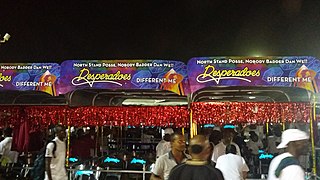Soca music is a genre of music defined by Lord Shorty, its inventor, as the "Soul of Calypso", which has influences of African and East Indian rhythms. It was originally spelled "sokah" by its inventor but through an error in a local newspaper when reporting on the new music it was erroneously spelled "soca"; Lord Shorty confirmed the error but chose to leave it that way to avoid confusion. It is a genre of music that originated in Trinidad and Tobago in the early 1970s and developed into a range of styles during the 1980s and after. Soca was initially developed by Lord Shorty in an effort to revive traditional calypso, the popularity of which had been flagging amongst younger generations in Trinidad due to the rise in popularity of reggae from Jamaica and soul and funk from the United States. Soca is an offshoot of calypso/kaiso, with influences from East Indian rhythms and hooks.
The music of Trinidad and Tobago is best known for its calypso music, soca music, chutney music, and steelpan. Calypso's internationally noted performances in the 1950s from native artists such as Lord Melody, Lord Kitchener and Mighty Sparrow. The art form was most popularised at that time by Harry Belafonte. Along with folk songs and African- and Indian-based classical forms, cross-cultural interactions have produced other indigenous forms of music including soca, rapso, parang, chutney, and other derivative and fusion styles. There are also local communities which practice and experiment with international classical and pop music, often fusing them with local steelpan instruments.

The steelpan is a musical instrument originating in Trinidad and Tobago. Steelpan musicians are called pannists.
The music of the Lesser Antilles encompasses the music of this chain of small islands making up the eastern and southern portion of the West Indies. Lesser Antillean music is part of the broader category of Caribbean music; much of the folk and popular music is also a part of the Afro-American musical complex, being a mixture of African, European and indigenous American elements. The Lesser Antilles' musical cultures are largely based on the music of African slaves brought by European traders and colonizers. The African musical elements are a hybrid of instruments and styles from numerous West African tribes, while the European slaveholders added their own musics into the mix, as did immigrants from India. In many ways, the Lesser Antilles can be musically divided based on which nation colonized them.

The music of Antigua and Barbuda is largely African in character, and has only felt a limited influence from European styles due to the population of Antigua and Barbuda descending mostly from West Africans who were made slaves by Europeans.

The Trinidad and Tobago Carnival is an annual event held on the Monday and Tuesday before Ash Wednesday in Trinidad and Tobago. This event is well known for participants' colorful costumes and exuberant celebrations. There are numerous cultural events such as "band launch fetes" running in the lead up to the street parade on Carnival Monday and Tuesday. It is said that if the islanders are not celebrating it, then they are preparing for it, while reminiscing about the past year's festival. Traditionally, the festival is associated with calypso music, with its origins formulated in the midst of hardship for enslaved West and Central Africans; however, recently Soca music has replaced calypso as the most celebrated type of music. Costumes, stick-fighting and limbo competitions are also important components of the festival.

The Trinidad and Tobago Regiment is the main ground force element of the Trinidad and Tobago Defence Force. It has approximately 10,000 men and women organized into a Regiment Headquarters and four battalions. There is also a Volunteer Defence Force that has been renamed the Defence Force Reserves. The regiment has two primary roles: maintaining the internal security of Trinidad and Tobago, and the assistance of local law enforcement.

The culture of Dominica is formed by the inhabitants of the Commonwealth of Dominica. Dominica is home to a wide range of people. Although it was historically occupied by several native tribes, it was the Taíno and Island Caribs (Kalinago) tribes that remained by the time European settlers reached the island. "Massacre" is a name of a river dedicated to the murders of the native villagers by both French and British settlers, because the river "ran red with blood for days." Each claimed the island and imported slaves from Africa. The remaining Caribs now live on a 3,700-acre (15 km2) Carib Territory on the east coast of the island. They elect their own chief.
The Honourable David Michael Rudder OCC is a Trinidadian calypsonian, known to be one of the most successful calypsonians of all time. He performed as lead singer for the brass band Charlie's Roots. Nine years later, Rudder stepped outside the band, entering the calypso tent as a solo calypsonian in 1986, which was followed by an unprecedented rise to fame.

The Antiguan Carnival is a celebration of the emancipation of slavery in the country held annually from the end of July to the first Tuesday in August. The most important day is that of the j'ouvert, in which brass and steel bands perform for much of the island's population. Barbuda's Carnival, held in June, is known as Caribana. The Antiguan and Barbudan Carnivals replaced the Old Time Christmas Festival in 1957, with hopes of inspiring tourism in Antigua and Barbuda. Some elements of the Christmas Festival remain in the modern Carnival celebrations.

As an overseas department of France, Martinique's culture is French and Caribbean. Its former capital, Saint-Pierre, was often referred to as the Paris of the Lesser Antilles. The official language is French, although many Martinicans speak a Creole patois. Based in French, Martinique's Creole also incorporates elements of English, Spanish, Portuguese, and African languages. Originally passed down through oral storytelling traditions, it continues to be used more often in speech than in writing.
Denzil "Belt" Botus is a pannist from Trinidad. He is best known for holding the record for most winning steel band Panorama arrangements and his heavy jazz influence in calypso/soca music. Botus has been active since the 1960s and is considered one of the best steel drummers in the world.
Raymond Anthony Holman is a musician, composer, pannist and performer from Trinidad and Tobago.
Panorama is an annual music competition of steelbands from Trinidad and Tobago, taking place since 1963. It is usually held around Carnival time.

Sterling Betancourt MBE, FRSA is a Trinidad-born pioneer, arranger and musician on the steelpan, a major figure in pioneering the Pan in Europe and the UK (1951).

The Desperadoes Steel Orchestra, also called Despers, are a steelband from Laventille in Trinidad, formed in 1945.
Rudolph Charles was a musician and instrument maker of the steelpan, but most notably, he was a pioneer and leader of the steelband movement in Trinidad and Tobago. Also known as Charlo, The Hammer and Trail, among other names, he led Desperadoes Steel Orchestra to 10 various victories from 1965 to 1985, including six Panoramas, two Classical Music Festivals, one Best Bomb and one Best Playing Steel Orchestra.
The Trinidad and Tobago Police Service Band is a Caribbean police musical unit in the Republic of Trinidad and Tobago, located in the capital of the Port of Spain. It was founded in 1866 to provide support to local militia and police units, in absence of an active military band. In 1964, Guillermo Antonio Prospect formed the first police steel band. A notable member of the band was Lieutenant Joseph Nathaniel Griffith, who later served as bandmaster of the Royal Saint Lucia Police Band and was previously with the Antiguan Police Band. Another member was Superintendent Enrique Moore, who was present with the band when it went to a tattoo in Berlin in 2003.
Melodians Steel Orchestra UK is a band formed in Harrow in October 1987 by Terrance "Terry" Noel MBE, composed of orchestra members using the steelpan instrument. They have since achieved considerable success in their musical and community endeavours, being well-recognised by various UK Governmental organisations, the Diplomatic Service and NGOs such as PRS for Music. The band has since assumed a status of national importance to modern British culture and has become symbolic of the importance of the relationship between the UK and the Commonwealth, particularly Trinidad and Tobago.

Platinum Jubilee Celebration: A Gallop Through History was an equestrian event held in the grounds of Windsor Castle on four evenings from 12 to 15 May 2022, as part of Elizabeth II's Platinum Jubilee celebrations.











